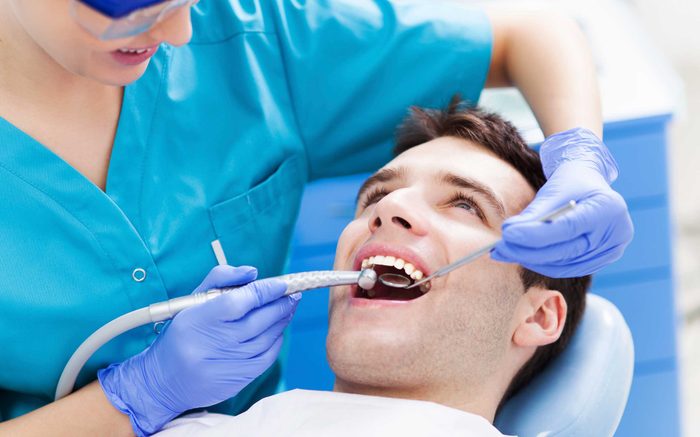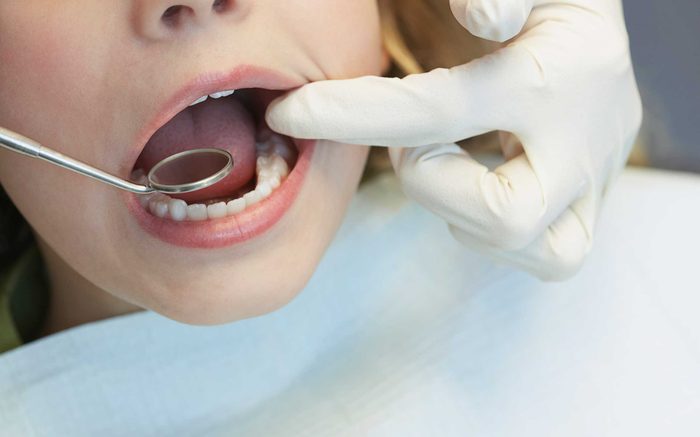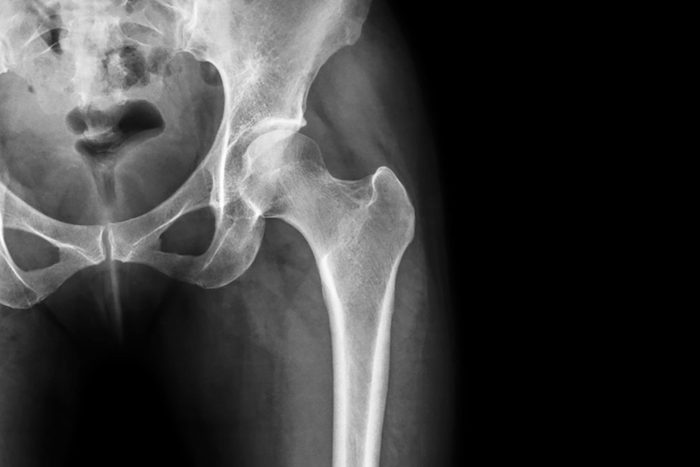Dentists can discover serious health problems
When you have a dentist appointment, you may only be thinking about the health of your teeth. However, your dentist knows that many health problems can affect your teeth and gums as well. Even Covid-19 is causing tooth problems.
“People think we’re only looking at teeth,” says Gigi Meinecke, DMD, spokesperson for the Academy of General Dentistry and a dentist in private practice in Potomac, Maryland. “But typically we’re looking at all of the soft tissues in the mouth.”
This access can allow dentists to identify a number of surprising conditions—from diabetes to GERD (gastroesophageal reflux disease)—possibly before you or your doctor are aware of them. Here are the most common diseases your dentist might be able to detect. (Here are the 13 things every dentist wants you to know before your next appointment.)

Crohn’s disease
Dr. Meinecke says that she’s seen swollen lips and dime-sized ulcers on the inside of cheeks and lips—a white center with a red halo circling it. If she suspects Crohn’s disease, an inflammatory bowel disease that can cause these symptoms, she’ll do X-rays to rule out gum disease and ask about medical history and medications.
“If I can’t find a reasonable explanation for the symptoms, I’ll recommend they see their regular doctor,” she says.

Diabetes
Bleeding, receding, dry gums, dry mouth, and wiggly teeth are all typical oral symptoms of patients with diabetes, who are more likely to get gum disease, says Sam Morhaim, DDS, a periodontist in Great Neck, New York. However, many of these symptoms result from simple poor hygiene, so dentists may not assume it’s diabetes unless other risk factors are there, or you have these symptoms despite taking good care of your mouth. (Here are 10 silent signs of type 2 diabetes you may be missing.)
If your dentist suspects signs of diabetes, he’ll likely recommend a blood test at your primary care doctor’s office. Oral health and diabetes management are closely linked, Dr. Morhaim notes. Patients who take better care of their teeth and gums may have better blood sugar control; patients with better blood sugar control may have less severe cases of gum disease. (If you have a mouthful of cavities, make sure you avoid these foods that dentists swear they never eat.)

Oral cancer
Oral cancer is the sixth most common cancer in America, with about 53,000 Americans to diagnosed this year,according to the Oral Cancer Foundation. Regular dental visits can help catch signs of it in its earliest stages, when survival rates are more than 80 percent.
Oral cancer shows up as white and red lesions, usually on the tongue, the floor of the mouth, and the soft palate tissues in the back of the tongue. Early on, the lesions are usually painless and tough for patients to spot themselves. Ask your dentist to perform an oral cancer screening during checkups.
It’s particularly important if you have risk factors for the disease, including smoking, heavy alcohol use, and exposure to the the human papillomavirus (HPV) (the same virus that causes cervical cancer). (Don’t miss these 37 secrets your dentist will never tell you.)

Anemia
If the lining of someone’s mouth is very pale—a light shade of pink—dentists might suspect anemia, a condition in which the body doesn’t have enough red blood cells circulating, says Dr. Meinecke. As well, the tongue can lose its typical bumpy texture and become smooth looking. (These are the amenia symptoms you shouldn’t ignore.)

GERD
Stomach acid—with a pH that’s lower than vinegar—that regurgitates into the esophagus and mouth can dissolve tooth enamel and create erosive lesions near the back of the mouth. While many people with GERD recognize it by the uncomfortable heartburn symptoms, some patients only experience GERD while they sleep and may not know they have it. “It’s common for patients to say they’re having trouble sleeping and not know why they’re waking in the middle of the night,” says Dr. Meinecke. She advises patients with GERD symptoms to consider proton-pump inhibitors like Nexium and Prevacid, which reduce acid production. (Make sure you know these 30 everyday mistakes that are secretly ruining your smile.)

Intense stress
You certainly know when you’ve had a rough week at work, but the state of your mouth may indicate that stress is taking a more serious toll than you realize. Many people may grind their teeth—a condition known as bruxism—in response to stress, which can wear down and chip your pearly whites. Swear you’re not a tooth grinder? Dr. Morhaim says most of his patients tend to do it at night while they’re sleeping. A customized night guard to wear while you sleep may help.

Osteoporosis
Osteoporsis is difficult to detect because it has no symptoms, which means most people don’t know they have it until they get a bone fracture or take a bone density test. However, an annual trip to the dentist’s office may be just what your bones need before it’s too late. And bone loss in the mouth typically means there are signs of bone loss elsewhere in the body. (These are the 10 things dentists always do to prevent their own teeth from rotting out of their mouth.)

Dementia
Memory loss and confusion aren’t the only warning signs of the early stages of dementia—poor oral hygiene is too.
In fact, researchers from the University of California followed nearly 5,500 senior citizens for 18 years and found that those who brushed their teeth less than once a day were up to 65 percent more likely to develop dementia than those who brushed their teeth every day.

Rheumatoid arthritis
Rheumatoid arthritis may cause joint pain and swelling, but early signs of the autoimmune condition can also appear in your mouth, especially in young people. In some patients, jaw swelling, an achy jaw, or not being able to open your mouth too wide can be a sign of early-onset rheumatoid arthritis. (Here are the 8 foods people with rheumatoid arthritis should avoid.)

Heart disease
Swollen, red, bleeding gums may be a telltale warning sign of heart disease. In fact, gum disease may put you at risk for both coronary artery disease and heart disease because the bacteria could travel to your heart and form blood clots or build up plaque in your arteries, which can be detrimental to your heart’s blood flow. (If you often experience bleeding gums, try getting into one of these 11 habits your dentist wants you to start right now.)